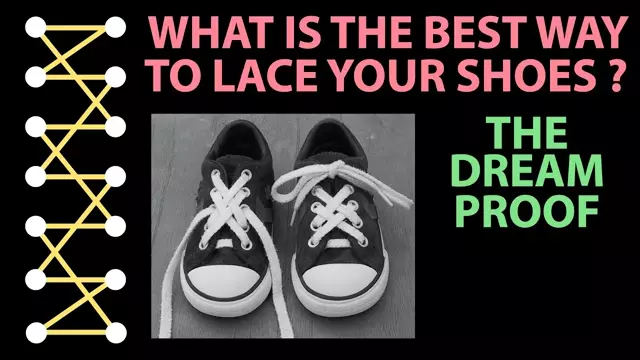2020-06-20
[public] 185K views, 9.30K likes, 135 dislikes audio only
A blast from the past. A video about my fun quest to pin down the best ways of lacing mathematical shoes from almost 20 years ago. Lots of pretty and accessible math. Includes a proof that came to me in a dream (and that actually worked)!
0:00 Intro
1:31 What's a mathematical lacing?
4:42 What does "best" mean?
5:15 What is the shortest lacing? Crisscross and bowtie lacings.
8:42 How to prove that the shortest are the shortest? Travelling salesman problem
12:36 What are the longest lacings? Devil and angel lacings.
13:48 What about real lacings?
15:16 What are the strongest lacings?
17:17 Can proofs hatched in dreams be true?
Some links:
Ian's shoelace site
https://www.fieggen.com/shoelace
and his explanations of what's wrong with the way a lot of people tie their shoelaces
https://www.fieggen.com/shoelace/grannyknot.htm
John Halton's proof that the crisscross lacing is always the shortest tight lacings
Halton, J.H. The shoelace problem. The Mathematical Intelligencer 17 (1995), 37–41
http://www.cs.unc.edu/techreports/92-032.pdf
My shoelace article in Nature
https://www.nature.com/articles/420476a.pdf
A preview of my shoelace book at Google books
Here is a page on the German travelling salesman problem that I mention in the video
http://www.math.uwaterloo.ca/tsp/d15sol/dhistory.html
I actually got the number of cities a bit wrong. It's 15,112 cites and not 18000.
My article on shoelaces was inspired by this fun article by Thomas Fink and Yong Mao about Designing tie knots by random walks (also in Nature)
https://www.tcm.phy.cam.ac.uk/~ym101/tie4/nature_tiepaper.pdf
The extended version
https://www.tcm.phy.cam.ac.uk/~tmf20/TIES/PAPERS/paper_physica_a.pdf
They also wrote a really nice book about tie knots
https://en.wikipedia.org/wiki/The_85_Ways_to_Tie_a_Tie
Enjoy!
Burkard
/youtube/video/0KjG8Pg6LGk
/youtube/video/_GkxCIW46to
/youtube/video/N-KXStupwsc
/youtube/video/CSw3Wqoim5M?t=91
/youtube/video/CSw3Wqoim5M?t=282
/youtube/video/CSw3Wqoim5M?t=315
/youtube/video/CSw3Wqoim5M?t=522
/youtube/video/CSw3Wqoim5M?t=756
/youtube/video/CSw3Wqoim5M?t=828
/youtube/video/CSw3Wqoim5M?t=916
/youtube/video/CSw3Wqoim5M?t=1037
/youtube/video/XR2u7izwZ04
/youtube/video/94mV7Fmbx88

